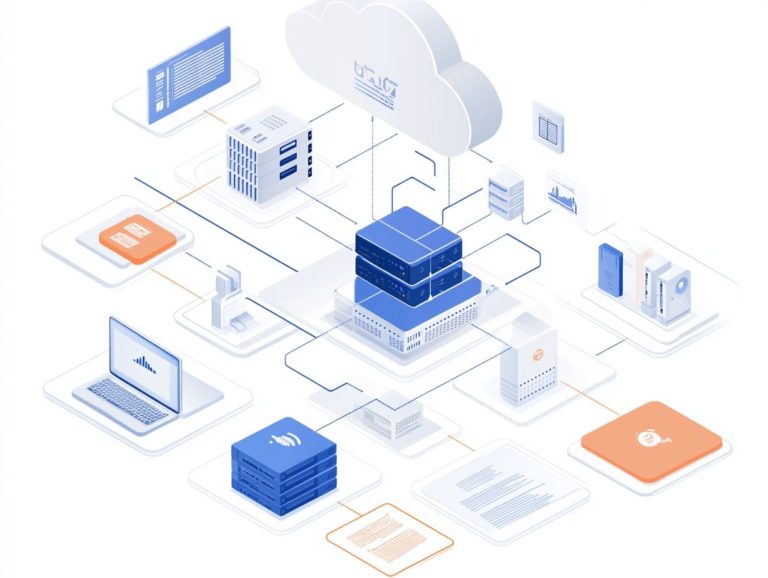What is PaaS and Its Benefits?
In today’s fast-paced tech environment, Platform as a Service (PaaS) stands out as a modern tool for businesses eager to enhance efficiency and drive innovation.
This article delves into what PaaS entails, highlighting its core benefits including cost savings and scalability and showcasing real-world applications across diverse industries.
You ll learn how to select the ideal PaaS provider tailored to your specific needs and uncover best practices for successful implementation.
Prepare to explore how PaaS can revolutionize your business operations.
Contents
Key Takeaways:
PaaS is a cloud computing model that offers a platform for developers to build, run, and manage applications without the need for infrastructure or software. PaaS provides cost savings by eliminating the need for hardware and software investment and maintenance, allowing businesses to pay only for the resources they use. PaaS offers scalability and flexibility by automatically adjusting resources based on demand, allowing businesses to easily handle spikes in traffic and scale up or down as needed.
Understanding PaaS
Platform as a Service (PaaS) is an advanced cloud computing service model tailored specifically for developers. It offers a complete environment for building, deploying, and managing applications seamlessly.
By simplifying the software development process, PaaS provides a rich assortment of tools and services that enhance operational efficiency and drive down costs. This allows project teams to concentrate on crafting intelligent applications, freeing them from the complexities of infrastructure management.
Definition and Overview
PaaS, or Platform as a Service, is an advanced cloud computing service model designed to offer you a scalable development environment. This makes it easier than ever to create and deploy applications efficiently.
This exciting approach lets you concentrate on what you love coding! without the hassle of managing the underlying infrastructure. PaaS includes essential components such as runtime environments, development tools, software that connects different applications, and database management systems, all streamlined for your convenience.
Positioned within the larger cloud computing ecosystem alongside IaaS (Infrastructure as a Service) and SaaS (Software as a Service), PaaS fills a unique niche. IaaS offers virtualized computing resources over the internet, while SaaS provides software applications via the web. PaaS equips you with the necessary environment to develop, test, and maintain your applications seamlessly.
Prominent examples of PaaS offerings include Oracle Cloud Platform, Microsoft Azure App Service, and Google App Engine, each designed to enhance your development process and boost productivity.
Benefits of PaaS
PaaS presents a wealth of advantages that elevate your software development process. Leveraging cloud services allows you to achieve substantial cost reductions, enhanced scalability, and improved operational efficiency. To explore these benefits further, consider the reasons outlined in why choose PaaS for application development.
This powerful model gives your business the power to innovate and adapt seamlessly in today s dynamic landscape.
Cost Savings
One of the most significant advantages of PaaS lies in its remarkable potential for cost savings. It enables you to allocate resources more efficiently while minimizing operational expenses.
This versatile platform not only frees you from the burden of expensive hardware investments but also simplifies software licensing fees through a subscription model, giving you a predictable monthly expense. For example, if you’re a startup utilizing a PaaS solution for application development, you can drastically cut down on costs related to maintaining on-premises servers and software licenses.
This allows you to channel your energy toward growth and innovation. Consider companies like Netflix and Airbnb; they ve successfully woven PaaS into their operations, leading to substantial reductions in their IT budgets.
By transitioning to cloud-based solutions, they ve been able to scale swiftly without the encumbrance of hefty upfront capital expenditures. Discover how PaaS can not only streamline your processes but also unlock new opportunities for growth and innovation!
Scalability and Flexibility

PaaS provides great scalability and flexibility. You can easily adjust resources based on the changing demands of your applications and customers.
This level of adaptability is essential in today’s rapidly evolving technological landscape. Businesses often face unpredictable user traffic and shifting project requirements.
Without the appropriate tools, these fluctuations can lead to performance challenges or inefficient resource allocation.
Fortunately, PaaS platforms come equipped with automatic scaling features. These features dynamically respond to real-time usage, enabling your application to expand during peak demand and contract when things quiet down.
These platforms offer various storage options and data services. This allows you to customize your solutions for specific performance benchmarks while ensuring efficiency and cost-effectiveness.
Streamlined Development Process
Utilizing PaaS can revolutionize your business development process! It equips you with tools for coding automation and integration that enhance productivity.
With pre-configured environments that eliminate setup headaches, you can concentrate on innovation instead of getting bogged down by tedious configurations.
PaaS also provides seamless integration tools, making it easy for you to connect to various APIs and services.
Renowned PaaS providers like Heroku, Google App Engine, and Microsoft Azure offer a wealth of development tools, including:
- Databases
- Testing frameworks
- Middleware solutions
These resources promote collaboration among your project teams, enabling efficient teamwork. Consequently, the software development lifecycle becomes more agile and closely aligned with your business objectives, delivering higher-quality products in shorter timeframes.
Use Cases for PaaS
PaaS offers a wealth of use cases across various industries, empowering you to develop, deploy, and manage applications that meet your enterprise needs and customer demands.
Examples of Industries and Applications
PaaS is a powerful tool utilized across various industries. It provides solutions for developing enterprise applications, harnessing AI capabilities, and facilitating real-time analytics all of which significantly enhance operational efficiency.
In the finance sector, platforms like Google Cloud’s PaaS allow you to build applications that leverage machine learning for fraud detection. This enables you to swiftly identify and mitigate suspicious activities.
In healthcare, you can utilize Microsoft Azure to create telemedicine applications that harness AI. These solutions deliver personalized patient care through real-time data analysis and predictive insights.
In the e-commerce realm, PaaS solutions like AWS empower you to develop recommendation engines that elevate customer experiences, drive sales, and optimize inventory management by analyzing purchasing trends.
These applications not only streamline operations but also foster innovation, significantly elevating overall service delivery.
Choosing the Right PaaS Provider
Choosing the right PaaS provider is essential for your business. Carefully evaluate different cloud providers, considering their features, services, and compatibility with your existing systems.
This decision will have a significant impact on your operational efficiency and future growth.
Key Factors in Choosing a PaaS Provider

When choosing a PaaS provider, take a thoughtful approach. Weigh factors like security protocols, pricing models, and the provider s reliability.
In today s digital landscape, security protocols are very important. A breach can lead to devastating data losses and financial repercussions, so ensure that your platform uses strong encryption and complies with rules that protect personal information.
Next, scrutinizing pricing models is vital for your business’s long-term sustainability. Unexpected costs can disrupt your budget and stifle growth.
Reliable customer support is also crucial. Having access to knowledgeable staff can resolve potential issues quickly and keep your operations running smoothly.
By considering these factors, you can empower your organization to enhance its development processes while maintaining a secure and cost-effective environment.
Implementing PaaS in Your Business
Implementing PaaS in your business may present challenges. However, by following best practices and using the right development tools, you can ensure seamless integration and unlock significant operational benefits.
Best Practices and Tips
Adopting best practices for PaaS implementation can elevate your development process. This improvement enhances teamwork, efficiency, and application performance.
Cultivating a culture of automation is key. Use coding automation tools to streamline repetitive tasks and boost productivity.
Clear communication among your teams is essential. This ensures everyone stays aligned on objectives and can resolve issues swiftly.
Establishing a strong monitoring strategy is essential. It provides real-time insights into performance and helps your teams address issues proactively.
By embracing these practices, you can unlock amazing benefits and pave the way for more innovative solutions!
Frequently Asked Questions
What is PaaS and Its Benefits?
PaaS stands for Platform as a Service. It’s a cloud computing model that provides developers with a platform to build, run, and manage applications without worrying about infrastructure maintenance.
Its benefits include increased scalability, cost-effectiveness, and flexibility.
How does PaaS work?

PaaS provides a preconfigured platform with necessary tools for developers to build and deploy applications. This includes infrastructure, operating system, and development tools.
Developers can focus on writing code without managing the underlying infrastructure.
What are the advantages of using PaaS?
Some advantages of PaaS include cost reduction and faster time-to-market. Businesses save on infrastructure costs and deploy applications quickly.
PaaS allows scaling resources as needed and accessing applications from anywhere with an internet connection.
What types of applications can be built with PaaS?
PaaS can build various applications, including web and mobile applications, business process management systems, and IoT applications. Its flexibility accommodates different business needs.
What are some popular PaaS providers?
Popular PaaS providers include Microsoft Azure, Google Cloud Platform, Amazon Web Services, Heroku, and IBM Bluemix. Research each provider to find the best fit for your business.
Ready to enhance your business? Explore the best PaaS options today!
Is PaaS suitable for all businesses?
PaaS offers many benefits. However, it might not be suitable for every business.
Small businesses with fewer resources and basic needs might not gain as much from PaaS. Larger companies with more complex applications often see greater benefits.
Assess your business needs to see if PaaS fits your organization. Discover if PaaS can take your business to the next level. Don’t miss out on the potential advantages it may offer!







